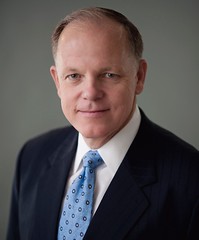By Doug Carver
“The Chaplaincy is the ‘mystery ministry’ of the church.” That’s how a pastor once described chaplaincy. People in general, even chaplains on occasion, seem to have a difficult time adequately explaining or understanding the valuable ministry of the chaplain.
What exactly is a chaplain and what do they do? A chaplain is simply a pastor or layperson commissioned and sent out by the local church to minister to people working in an institutional setting. Chaplaincy is a sacred calling to the gospel ministry that travels beyond church walls into closed communities surrounded by obstacles such as wired fences, gate guards, admission desks, prison bars and security clearances. It is a ministry that takes the love of Jesus Christ into dark, dirty and, often, dangerous places that normally restrict the compassionate outreach of the local church.
Corporate entities like Coca-Cola, Tyson Foods and General Motors recognize the value of employees living out their faith in the workplace—and corporate chaplains are there as an extension of the church. Hospitals see the value of faith and religion as a significant factor in the healing process—and hospital chaplains are there as an extension of the local church. Ministry during disasters requires greater spiritual sensitivity and more rapid response to human need—and Disaster Relief chaplains are there as an extension of the local church. Members of the United States Armed Forces regularly mobilize, train and deploy into combat environments around the world in defense of our nation–and military chaplains are there as an extension of the local church to ensure every service member maintains their free exercise of religion as guaranteed by the Constitution.
The ministry field where chaplains serve is exhaustive in scope, including hospices, medical centers, correctional facilities, concrete bunkers, combat outposts, fleets in the middle of the Pacific and flight lines around the world. The Southern Baptist Convention (SBC) entrusts the endorsement of Chaplains to the North American Mission Board’s (NAMB) Chaplain’s Commission, a small board of NAMB trustees who have one primary responsibility—to approve those God-called men and women who will faithfully represent Southern Baptists as chaplains on mission for Jesus Christ.
Perhaps the mystery surrounding chaplains involves their unique ministry in a particular workplace setting. Chaplains often serve as part of a completely secular staff, ministering to people of all faith backgrounds, or to those who profess no faith at all. Since every institutional environment is different, chaplains must be flexible in their ministry activities, adapting their pastoral care to the needs of a specific workplace.
Disciplined self-care is also essential, and often lifesaving, as chaplains regularly find themselves singularly responsible for the pastoral care of hundreds or thousands of people on a daily basis. Chaplains also serve at a level of accountability that far exceeds that of most pastors in the local church setting.
What are the necessary steps required for a person sensing a clear call to chaplaincy? First you must diligently pray for discernment that God is leading you into the ministry as a vocational or volunteer chaplain. Not everyone is called to chaplaincy.
Next, pursue denominational endorsement. Why is endorsement important? Many institutional chaplaincy positions (for example, the military, correctional facilities or hospitals) require endorsement from a denomination or religious organization as a condition for employment. Endorsement is a professional credential that affirms to a potential employer or agency that a chaplain has met the basic requirements of the denomination to provide ministry in a specialized setting, and that the individual is a member in good standing with their faith group.
Endorsement creates a covenant of mutual commitment, accountability and support between the chaplain and the denomination. It states a level of denominational connection and a standard of excellence to the deploying agency. Chaplains endorsed by the SBC are recognized for representing one of the largest protestant evangelical denominations in the United States.
Beyond that recognition, endorsed SBC chaplains receive mentoring, pastoral care, annual training and professional advice on ministry issues from the NAMB Chaplaincy Team, all of whom are seasoned chaplains.
Chaplains are always asked to describe the greatest reward of their chaplaincy ministry. One could easily say that it is the opportunity to provide the ministry of presence to individuals within various institutional settings. However, the most important ministry role of chaplains is the ability to share the gospel of Jesus Christ to closed communities and work environments unreachable by the local church.
Chaplains, unlike the local church, are in the unique opportunity to have gospel conversations on a daily basis with people they serve in the workplace who would not, in many cases, darken the door of any church or religious organization.
In reality, chaplaincy is the premier “mystery ministry” of the church. Chaplains have the freedom, responsibility and blessing to freely share “the mystery of the gospel” (Eph. 6:19, ESV) of Jesus Christ within institutions, work places and communities closed to the local church.
For additional information on chaplain ministry, please visit namb.net/chaplaincy, or call our NAMB office at 770-410-6367. Learn more about specific chaplain endorsement procedures at https://www.namb.net/pdf/endorsement-manual/.
Doug Carver, Major General, U.S. Army, Retired, is executive director for chaplaincy for NAMB.
Published November 7, 2015
